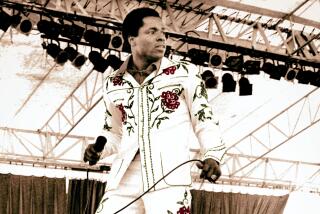2nd Time Around, Smaller Turnout Welcomes Glenn
- Share via
NEW CONCORD, Ohio — John and Annie Glenn returned Saturday to the town they left more than 50 years ago so he could become a pilot and eventually fly into space.
Fans lined the narrow sidewalks of their hometown of 2,000 in eastern Ohio’s hills to salute the Glenns with a parade celebrating the 77-year-old Glenn’s second spaceflight, aboard the shuttle Discovery.
It was their second trip down the middle of Main Street. The first came in 1962, after Glenn became the first American to orbit Earth.
The parade-watchers included Jim and Diana Hall, who drove about 30 miles from Newark to watch the parade in her hometown. Their children still attend New Concord’s John Glenn High School.
“It takes a lot of nerve, I believe, to make a trip into space at his age,” said Jim Hall, 49. “It scares me driving down Interstate 70.”
The Glenns rode a float featuring a replica of Discovery. They smiled and waved in a windy, cold drizzle. The crowd was estimated at 5,000, a tenth of the crowd at their 1962 parade.
After his Oct. 29 return to space, parades also were held for Glenn in New York City and Washington.
The Glenns, who grew up in New Concord and began dating when they were classmates at the local Muskingum College, left during World War II so Glenn could become a fighter pilot. They have returned occasionally, and both will teach part time at the college after Glenn’s 24-year Senate career ends next month.
This is where Glenn announced his campaigns for the Senate and his unsuccessful run for the presidency in 1984. He also announced his retirement last year here.
Sarah Bauer, a Muskingum student from suburban Columbus, screamed with delight when Annie Glenn pointed at her and shouted, “Hi!” Bauer was wearing the sweatshirt of the sorority they share: Delta Gamma Beta.
During a speech at the Muskingum gymnasium named in his honor, Glenn talked about growing up in New Concord during the Depression, when neighbors helped each other and government stepped in when conditions demanded it.
“There was a sense of community and community service then as well. I think we lost that.”
More to Read
Sign up for Essential California
The most important California stories and recommendations in your inbox every morning.
You may occasionally receive promotional content from the Los Angeles Times.













